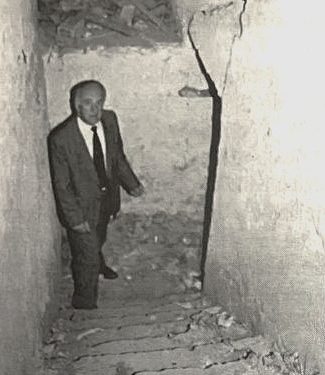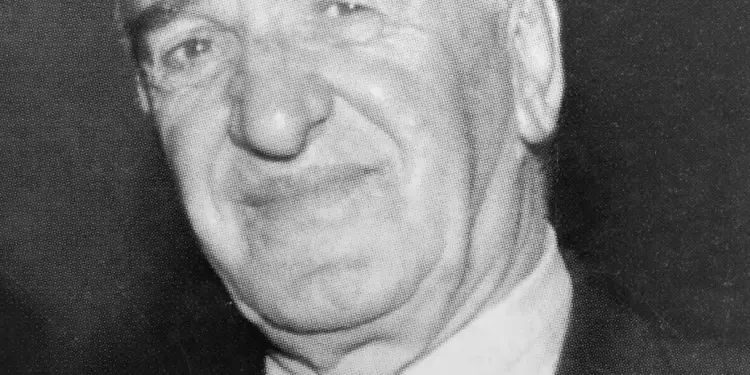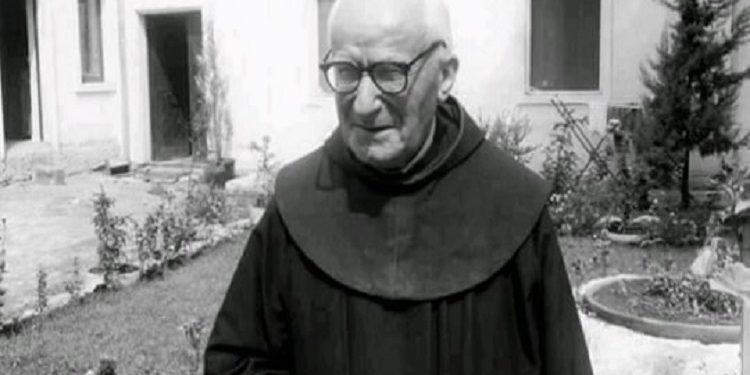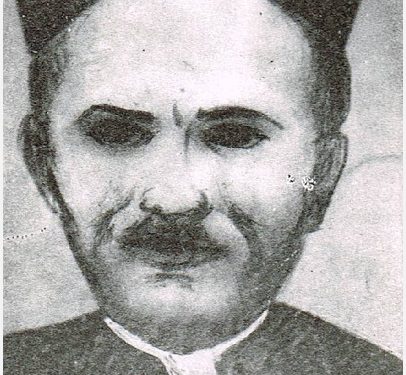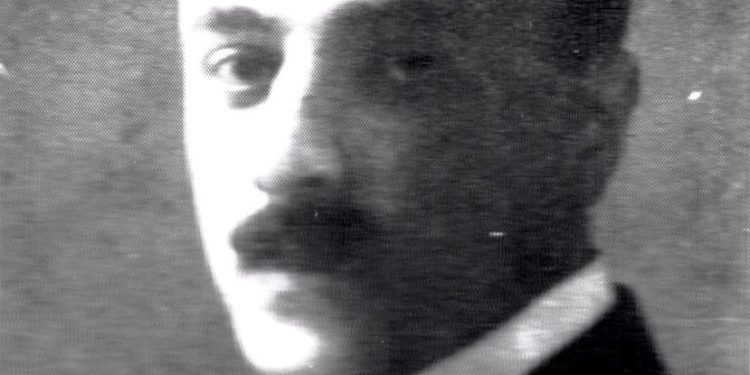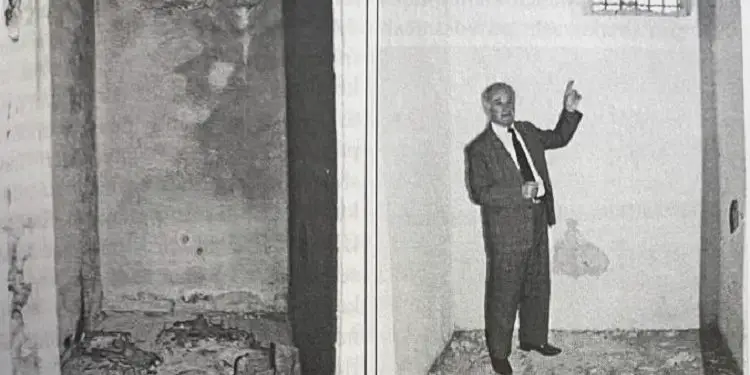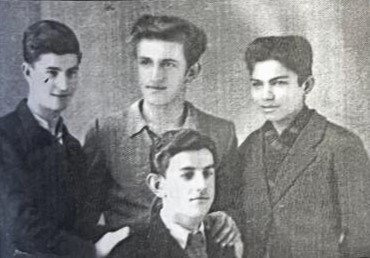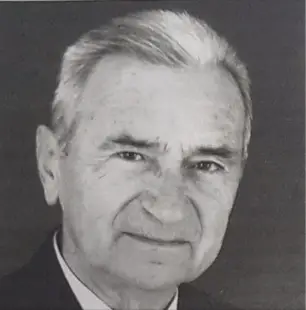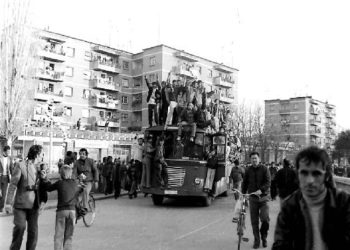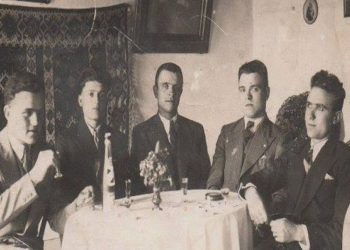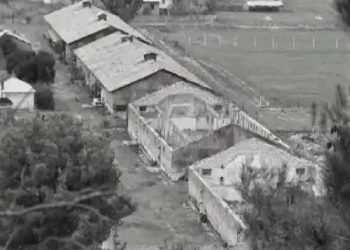By Ahmet Bushati
Part forty-four
Memorie.al/ After the flag was altered in 1944 with the addition of the communist star, Shkodra transformed into a center of resistance against the regime, paying a high price for its tradition of freedom. By April 1945, high school students, already feeling betrayed by the promises of the war, gathered to oppose the new terror that imprisoned and killed innocent people. Communism turned Kosovo into a province of Yugoslavia, while Shkodra was punished for its “historical crime”- its defiance against invaders. The “Postriba Movement” became a tool to suppress all dissent, plunging the city into an unprecedented spiral of suffering: imprisonments, executions, and the destruction of families. The high school students, alongside citizens, became symbols of resistance, while some “young communists” turned into tools of the State Security, leading to expulsions, imprisonments, and internments.
Four times, Shkodra rose in armed rebellion, but history forgot these battles. This book is written to remember the countless prisoners, the tortured, the killed, and the parents who suffered in silence. It is a warning against dictatorship and a plea for future generations not to forget the sacrifices made for freedom.
Continued from the previous issue
In the Footsteps of a Diary
Kolë Ndoun would always be seen sitting cross-legged, with his body held straight and his pipe lit. If you went to visit him, he would be so happy and so respectful on that occasion, that when you left him, you would feel that you had taken with you the pleasure of a warm conversation that he had had, different from what it might have seemed to you from a distance. Lala from Mirdite, had lived a life full of suffering and upheaval. He was a quiet and humane man, who also had a sweet and flowing way of telling stories so that the events in his mouth took on a special beauty and aroused in me so much curiosity and interest, that spending time with him would give me constant pleasure.
I think at that time he must have been about fifty years old. He had a face as if in a pale pink, with brown spots stamped all over it. On the occasion of the murder of Bardhok Biba, he had been arrested and sentenced to death and for three months he had remained under the heavy weight of that sentence. When he spoke to me about this period, he – as we have shown above – would speak in superlatives about Bajram Bajraktari, with whom he had been in the same room. An extreme poverty and a concept derived from it had once led him and his friends, even to the remote regions of Kosovo and Chameria, to rob cattle with the force of rifles, in order to enable the survival of the children, women and elderly people they had left in their homes.
With such a motive they would justify every robbery, that is, that not only would they not consider the theft as an anomaly, but they would also feel proud of the courage shown in such cases, and the more distant the place of their action was, the more honor they would believe they had brought to their country, while those who fell in the struggle with weapons in those cases would be remembered as those who fall in the war for the homeland.
In room no. 1 where I had secretly entered two or three times, the most interesting and most honorable figure, including the other two rooms, would be without a doubt that of Sheh Ali Bogdani from Bicaj of the River. I personally, never had the chance or opportunity to meet him. I looked at him with his modest – but very well-proportioned – body wrapped in a long brown robe, which he wore on his head one of those low hats usually worn by Muslim believers during prayer. He had a beard as soft as silk and as white as snow, which gracefully descended to his chest, and above all, a grace that illuminated as if with mystery that beautiful face of his, with very noble features, which together would have made you say that he was “Muhammad” himself descended to earth.
As the prisoners who were in the same room with him would tell us, he was always lost in deep meditations and prayers addressed to God. Religious culture, and especially devotion to God, which together with his wisdom and human prestige, had made him, as we said above, the most respected man. His “Il suo prediletto” (most chosen, or beloved) without any rival, would be Elez Troshani, for the religious vocation he had, as well as for the adoration as for a saint, that he had for Sheh Ali. Elez, accompanied by a policeman, would work all day as a pharmacist outside the prison and when we returned to the prison after lunch, and, until shortly before he fell asleep, he would spend all that time kneeling, and only kneeling, before Sheh Ali, as before God.
Sheh Ali had completed his religious studies in Istanbul. Two boys from Shistavec with the surname Ndergjuti, one of whom was named Ragip, would constantly stay by Sheh Ali’s side and would serve him in everything. In room no. 1 we had our friends, Ruzhdi Çoba, as well as the students Thabit Rusi, Rrok Pali, Refik Bushati, Gjon Ljarja, Lec Bruçaj, etc. In that room, there was also the prestigious old Ramadan aga, Dan Hasani, as always proud and authoritative, who enjoyed good health, despite his approaching eighty years.
There was also Mr. Zef Haxhia, as well as Riza Hoti, the father of my friend Burhan Hoti, in whose kind smile I constantly saw, it seemed to me that I read not only my relationship with my son, but also his gratitude as a parent, for not sending his son to the Sigurim. There was also the brave and respected hoxha, Hafiz Musa Dërguti, my cousin Ruzhdi Baja, as well as Rasim Hebovija, Qemal Dibra, the dentist Xhabir Dibra, the former partisan Gani Ymeri, Paulin Kel Pali, as well as my poor, tuberculosis, brave and loyal friend, our friend then and later, Mark Lleshi. There was also the spy Mark Fishta, etc.
The priests were in their element. We saw them very little only when they went to the W.C. Of these, those who were sick or completely incapable of physical labor were left without going to the camp, as well as anyone who, in order to justify staying within the small group of the workshop, could do a specialized job for the benefit of the directorate. Among the priests, one such person could be Father Leon Kabashi, with whom he managed to communicate in a way that was incomprehensible to the others, only Ramadan Sokoli, certainly interested in the painting work he had in hand. As far as I remember, there were also Monsignor Koliqi, Father Frano Kiri, Father Mark Harapi and Father Gegë Lumaj, as well as Father Rrok Gurashi, the priest with whom the communist government, through Tuk Jakova, continued – as they said – without resistance, the negotiations for the separation of the Catholic Church from the Vatican.
As well as the priests’ room, somewhere on the side of that building, there was also a women’s room, where Mrs. Adile Boletini was, as well as the younger ones, Drita Kosturi, Agime Pipa, Terezina Pali, Vitore Kuka, Ana Daja, Bedrije Ashiku, a Mirditore named Prenda, who we imprisoned citizens, our Mirditore friends, called “Beautiful Prenda”, because she was truly very beautiful, who had shown herself to be very brave and loyal to the people of the mountains. It would have hurt us greatly when, after a year, we heard that she had died in prison, from tuberculosis. With them, other women and girls.
As we have said on other occasions above, on the occasion of the murder of Bardhok Biba, many Mirditores were arrested, who, after a short trial, were brought in groups to our prison. Elez Troshani, who worked as a doctor inside the prison and, as such, had the duty to immediately disinfect those inmates, one evening, as he was being disinfected, would ask Elez: “What the hell is this, sir?” “We’ve been suffocated by lice!” – Elez would answer in a loud voice, and that inmate, as if talking to himself, would continue: “We’ve got lice, we’ve had them in Zogji’s meal too!” (For Zogu)
“The Big Prison” and some of its prisoners
On one of the last nights of November 1949, we political prisoners of the New Prison, hand in hand and in long rows, six or seven people, and accompanied by many policemen on the side, set off for the Big Prison, where the other prisoners from the Orman Pojani camp in Korça had returned the night before. We had been waiting with great interest for several days to join them, because in addition to our student friends, such as; Gjon Kovaçi, Injac Serreqi, Vitor Kujxhia and Çesk Hilgega, who had been arrested a few months before us, we also had others, among them even acquaintances, such as; Ahmet Kopliku, Gac Çuni, etc., as well as those we would soon meet, such as Gjovalin Zezaj, Çesk Gjeluci, and others, including those we had been told about since the New Prison, which had aroused our interest in meeting and getting to know them, including Luigj Kçira, whom I would like to single out as one of the most prominent young people in the prison.
There were times when, from the first night in that large prison, some prisoners would meet us, but especially the next day, when many of the other prisoners of that prison would meet us. I was particularly impressed by the first meetings with Zef Staku and Sami Repishti, which we held several nights in a row at dinner time and secretly from the guards, they would talk to us about the certainty of the overthrow of communism one day not far off, as well as about the need for our unity. Their warm and sincere words, as well as the idealistic spirit that they conveyed on that occasion to me and my friends, would make those meetings have acted among us, as unrepeatable messages of patriotism.
Contact with them then, as if it were outlining a path and concretizing a goal. After them, we would meet several times with Abdyl Rusi – who we had as a physical education professor until two years ago – Brahim Sokoli, Zef Zorba, Kolë Kurti, Shaqir, Ragip and Xhevat Meta, Gac Çuni, Injac Toni, Qamil Nikshiqi, Maliq Bushati and many, many others. We, the newcomers from the New Prison, were distributed among different rooms. So, me and some other friends were assigned to room no. 9.
The size of the space that a prisoner would occupy in this prison with a mattress would vary depending on the case, from 06-08 meters. In this room there were about one hundred and seventy prisoners, who would go with mattresses to it along the four walls, while two other rows of prisoners would go to the room in the middle and parallel to the first two side rows. The prisoners of the two middle rows of the room would sleep head-to-head with each other and, with their legs directed respectively towards one of the two side rows.
Between the legs of the prisoners of a side row and the middle one, a corridor would be created, constantly interrupted by legs, which would extend irregularly from two opposite directions. For us younger people, perhaps for the very beauty of our youthful soul, but also because there we were cultivating our inner life even more, through suffering and the ideal of freedom, all the prisoners around us would seem good and the one hundred and seventy prisoners in the room would be like one hundred and seventy different and interesting worlds to us, and this for the differences they had in character, culture, life experience, but also the places they came from, to remain forever like an open book, to be used by us.
It is impossible to portray the characters of the prisoners of a prison cell, for the many differences they have among themselves, but still, the most important fact of that heterogeneous ensemble of many people, would be how they, from the same fate, would have in common understanding, mutual respect and a solidarity, which cannot be found in any other case.
There are no words that can describe the wonderful harmony of hundreds and hundreds of prisoners of our time, who, strongly bound together by suffering, would stand together as if under the command of one brain and as if under the sway of one soul. Communism, which had forcibly separated them from family and freedom, had caused prison to unite and fuse them into a community where, as friends and brothers, they would have everything in common: honor, thought, determination, hatred, longing, and hope, even though each of them would continue to preserve their individual character, as well as that of the country they came from.
Books then – we penetrated there in large numbers through fake covers, but also directly – would be a constant food for our soul and mind, and they were also known as a development factor for us young people. Due to the lack of free life, the various events of novels, there more than outside, would give us the illusion of reality and make us perceive their characters as if they were living people, to the extent that their dramas or joys, as if they were not felt, would become part of our lives there. And so, not only books. Even today I remember, for example, the impressions that the sad and enigmatic portrait of Dostoevsky would constantly cause me, included in an Italian anthology, a figure that I would consider thoughtfully, with sadness and respect, as if he were alive.
Also, the pain that the unfortunate Raskolnikov, as well as the good Sonia, in the novel “Crime and Punishment”, which I read in Italian, would cause me at that time, with what words could I describe them then?! And another photo in that anthology, a photo of Russian slaves, tied body to body with ropes, pulling a ship with great difficulty from the two banks of a river, what an impression that would have made on me, then twenty years old! And also, a song dedicated to them, with lyrics and melody like the very difficult fate that they suffered, and for us to sing it with the sadness that it deserved.
We were raised in that way and were of that age, that in prison circumstances, even the titles of Migjen’s poems or prose, – as we may have said on other occasions – we could take them as messages and commitments, for a world of freedom and rights. The prisoner, sometimes hiding in his solitude, experiences moments of deep meditation, and when he is young, he often, so to speak, sails happily on the waves of his dreams, which inspire his patriotic and social ideals. With such inner strength, the prisoner turns his sufferings into morality and aspiration, thus not remaining a slave to lamentation, sorrow and pessimism, which would drown him prematurely.
Likewise, freedom, family life, and companionship cannot be valued as much as when they are completely absent, that is, when one is in the closed rooms of a prison, and the belief that one day one will enjoy them is also a further reason for the morale of a prisoner. The prisoner must hope, for which he seeks and finds his peers, to whom he entrusts not only his creed and optimism, – whatever it may be, well-founded or not – but also the most diverse details of his intimate life. In these ways, prison, through sympathies and preferences, regularly becomes a place of endless connections, connections that are ennobled by shared suffering and mutual intimacy, become a source of altruism and sacrifice, and finally those strong prison friendships are born, which prisoners take with them, even after they leave.
There could be no disorder in a prison cell, because, in addition to the discipline imposed by the administration, the prisoners themselves were also interested in order. The space of a few tens of centimeters wide was constantly the “prisoner’s home”, which could not be violated by anyone and would be respected by everyone. Every prisoner, without exception, would be “sovereign” in his place and without the permission of his master, no one could sit in it.
I would see that even within a collective, so numerous and cramped as a prison cell, each sought to realize his independent life, albeit in prison conditions. Thus, I would notice that while one prisoner was reading a book in his place, another, close by, was mending a piece of loot, a third might be lost in thought, and behind him, yet another, might have a friend visiting; other shifts might play chess, backgammon, etc. And so on, each one in his own way.
As a rule from the directorate, it was that prisoners were not to move from their place, but the degree of its implementation always depended on the “situation” we were going through, as well as on the policeman on duty. Even when they were able to allow the prisoners to move around without hindrance, he would still spend most of his time in his cell, where they would sit on a mat and lean their backs on the pillow rolled up since early in the morning. He would spend his most hours, having as his interlocutors perhaps one or both of the prisoners he had in his arms.
That small piece of land assigned to him would be, as we said, the house where people would come to stay with him and where, on festive occasions, he would receive and send off friends and acquaintances, just as he had done in his own house when he was free. On such days, the prisoners were guarded and cleaned from the moment they woke up and, when they had the opportunity, they would change a shirt or even a pair of trousers, and they would treat visitors to tobacco and, as the case may be, a caramel, or dried figs, nuts, or whatever they had reserved for that day, or whatever their family had brought them on the eve of the holiday.
During such a visit, the prisoners would ask each other more seriously than on other occasions about their families and, when they wanted to leave, they would wish each other with the words: “Thank you for the holiday finding you well and healthy, may you wait for the next holiday as your heart desires, with yours at home”! On a holiday, the prisoner, even if they were in the camp, would plan to bring a friend of his, often of another faith, to lunch, as the guest would consider this a true honor, which was done to them on that occasion.
During the first days of my arrival in this prison, I remember reading La Martini’s “Grazziella” in Italian. For pleasure, I read the novel of a hundred pages and, in a less than average format, twice more. I must say that, hand after hand, anyone who knew Italian could not fail to read and enjoy that novel, so much so that on that occasion, he would say with a laugh: “Even the old men played tricks on us”!
Events occur in prison which, for the humor they cause, are never forgotten. Thus, during those days, the police officer on duty, almost in vain, sentenced Hilmi Kamata to “the dungeon” and sent him down to one of the two dark dungeons, which the prison had, respectively, under its two stairs. At first, Hilmia had not noticed anything inside the dark dungeon where they had put her, but after a while, as if her eyes had “come to life”, she had noticed that there, not far from her, was another man, who at first seemed to be sleeping. Later, she would assure them that he was a dead man, a former Mirdita man over ninety years old, probably with the surname Tuna, with eyeless holes, which had been eaten away by mice.
In the company of this corpse, Hilmia would spend a long January night and would make us laugh every time we reminded her, and she would continue: “You didn’t want to see him die in your face, but my eyes would still go to him and it seemed to me that his eyes, like holes, were constantly looking at me”! There were several cases where rats had eaten the eyes of prisoners who were dying in the dungeons. For this reason, it seems that the directorate had ordered the police to send the dead among them, under any pretext, to also bring the living prisoners with them, in order to save the dead from having their eyes eaten by rats! Memorie.al
Continued in the next issue




